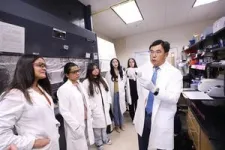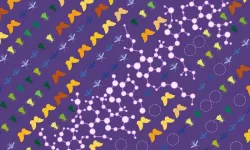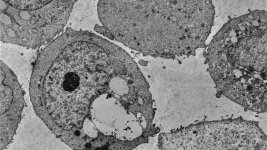(Press-News.org) Sergei Kalinin, a professor in the Department of Materials Science and Engineering, has been named the winner of the David Adler Lectureship Award in the Field of Materials Physics by the American Physical Society. The award recognizes one outstanding contributor in the field of materials physics who is notable for high-quality research, review articles, and lecturing.
“I am deeply honored to receive the Adler Award, as it recognizes the critical transition in materials discovery that my colleagues at the University of Tennessee and Pacific Northwest National Laboratory and I have championed,” Kalinin said. “Our vision emphasizes the necessity of high-throughput characterization alongside simulation and synthesis. The advancements in electron and scanning probe microscopy, combined with machine learning integration, represent a transformative step in closing the characterization loop, enabling us to make significant strides in understanding and discovering new materials.”
As the winner of the award, Kalinin will receive a $5,000 honorarium. The award will be presented at the March APS meeting, where Kalinin will present an invited talk before the appropriate focused session of the Materials Physics Division.
While the significance of research was important in winning the award, special attention was paid to the written and oral skills of the winner. As someone who pushes for further understanding and discovery in the field, Kalinin believes good communications skills are vital.
“The acknowledgment from APS reinforces the importance of our approach to ‘go small’ in our methodologies to ultimately ‘go big’ in the impact we can achieve within the field,” Kalinin said. “This recognition inspires me to continue pushing the boundaries of materials discovery, fostering innovation and collaboration in our scientific community.”
END
Kalinin receives David Adler Lectureship Award
2024-10-24
ELSE PRESS RELEASES FROM THIS DATE:
Evaluating the link between chemicals and declining insect populations
2024-10-24
Few people are fans of stink bugs, mosquitoes, or boll weevils, but insects play a key role in the circle of life that makes up the planet’s environment. In fact, world-renowned biologist E. O. Wilson famously declared that if insects vanished, our environment would collapse.
Scientists have noted that insect behaviour has been changing, and their populations are declining – on average 2-3% per year. This has prompted them to investigate the potential causes of this change, such as habitat loss due to overdevelopment, climate change, and chemical use.
EMBL researchers and collaborators recently investigated how pesticides, herbicides, ...
Scientists discover molecules that store much of the carbon in space
2024-10-24
A team led by researchers at MIT has discovered that a distant interstellar cloud contains an abundance of pyrene, a type of large, carbon-containing molecule known as a polycyclic aromatic hydrocarbon (PAH).
The discovery of pyrene in this far-off cloud, which is similar to the collection of dust and gas that eventually became our own solar system, suggests that pyrene may have been the source of much of the carbon in our solar system. That hypothesis is also supported by a recent finding that samples returned from the near-Earth asteroid Ryugu contain large quantities of pyrene.
“One of the big questions in ...
Sublethal agrochemical exposure disrupts insect behavior and long-term survivability
2024-10-24
Even at concentrations too low to kill, exposure to widely used agrochemicals – pesticides, herbicides, and fungicides, among others – has pervasive negative impacts on insect behavior and physiology, researchers report. The findings highlight the need for more comprehensive pesticide assessments, focusing not just on lethality but also on unintended long-term ecological harm to safeguard biodiversity. Over the past decade, many reports have highlighted alarming declines in insect ...
Understanding that US wildfires are becoming faster-moving is key to preparedness
2024-10-24
“The modern era of megafires is often defined based on wildfire size,” say Jennifer Balch and colleagues in a new study, “but it should be defined based on how fast fires grow and their consequent societal impacts.” Balch and colleagues report that wildfire growth rates in the U.S. have surged over 250% over the last 2 decades. Although these fast-moving infernos, or “fast fires” – those spreading more than 1,620 hectares in a day – account for only 2.7% of wildfire events from 2001 to 2020, researchers report that they are responsible for 89% of the total structures damaged ...
Model predicts PFAS occurrence in groundwater in the US
2024-10-24
According to a new machine learning-assisted predictive model, as many as 95 million Americans may rely on groundwater containing PFAS for their drinking water supplies before any treatment, researchers report. This raises concerns about unmonitored contamination in domestic and public water supplies. Per- and polyfluoroalkyl substances (PFAS), often called “forever chemicals,“ are highly persistent environmental contaminants linked to adverse environmental and health effects. Used in many consumer products, these organic pollutants have become ubiquitous in the environment and ...
By studying new species of tardigrade, researchers glean insights into radiation tolerance
2024-10-24
Tardigrades, eight-legged microorganisms colloquially known as “water bears,” are the most radiation-tolerant animals on Earth. Now, by studying a newly identified species of tardigrade, researchers have gleaned valuable insights into the animal’s ability to withstand radiation. These findings hold implications for safeguarding human health in extreme environments, such as spaceflight. Roughly 1,500 species of tardigrades have been described. These creatures can endure gamma radiation ...
Plastic chemical causes causes DNA breakage and chromosome defects in sex cells
2024-10-24
A new study conducted in roundworms finds that a common plastic ingredient causes breaks in DNA strands, resulting in egg cells with the wrong number of chromosomes. Monica Colaiácovo of Harvard Medical School led the study, which was published October 24 in the journal PLOS Genetics.
Benzyl butyl phthalate (BBP) is a chemical that makes plastic more flexible and durable, and is found in many consumer products, including food packaging, personal care products and children’s toys. Previous studies have shown that BBP interferes with ...
Vitamin K supplement slows prostate cancer in mice
2024-10-24
Prostate cancer is a quiet killer. In most men, it’s treatable. However, in some cases, it resists all known therapies and turns extremely deadly. A new discovery at Cold Spring Harbor Laboratory (CSHL) points to a potentially groundbreaking solution. CSHL Professor Lloyd Trotman’s lab has found that the pro-oxidant supplement menadione slows prostate cancer progression in mice. The supplement is a precursor to vitamin K, commonly found in leafy greens. The story begins more than two decades ago.
In 2001, the National Cancer Institute’s SELECT trial sought to determine if an antioxidant ...
Wildfires are becoming faster and more dangerous in the Western U.S.
2024-10-24
Fast-growing fires were responsible for nearly 90 percent of fire-related damages despite being relatively rare in the United States between 2001-2020, according to a new study led by the University of Colorado Boulder. “Fast fires,” which thrust embers into the air ahead of rapidly advancing flames, can ignite homes before emergency responders are able to intervene. The work, published today in Science, shows these fires are getting faster in the Western U.S., increasing the risk for millions of people.
The research highlights a critical gap in hazard preparedness across the U.S. — National-level ...
Gut bacteria transfer genes to disable weapons of their competitors
2024-10-24
Bacteria evolve rapidly in the human gut by sharing genetic elements with each other. Bacteriodales is a prolific order of gut bacteria that trade hundreds of genetic elements. Little is known, however, about the effects of these DNA transfers, either to the fitness of the bacteria or the host.
New research from the University of Chicago shows that a large, ubiquitous mobile genetic element changes the antagonistic weaponry of Bacteroides fragilis, a common bacterium of the human gut. Acquisition of this element shuts down a potent weapon ...




